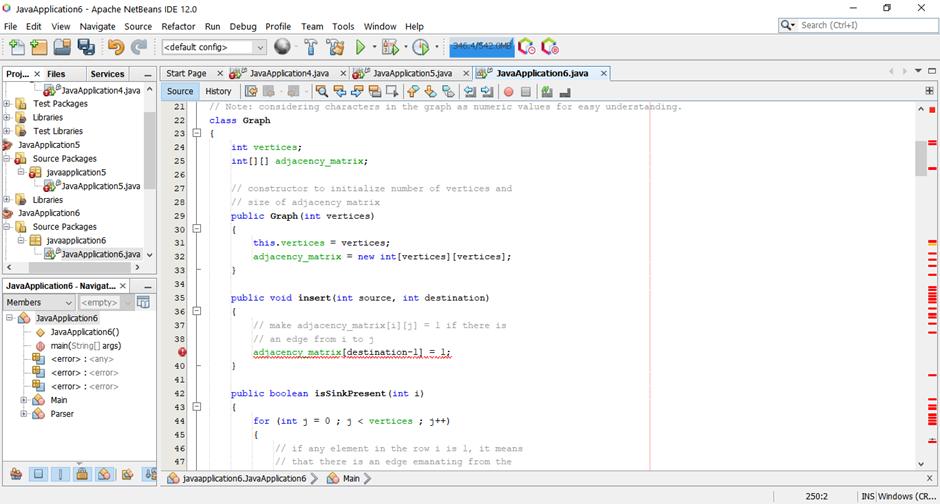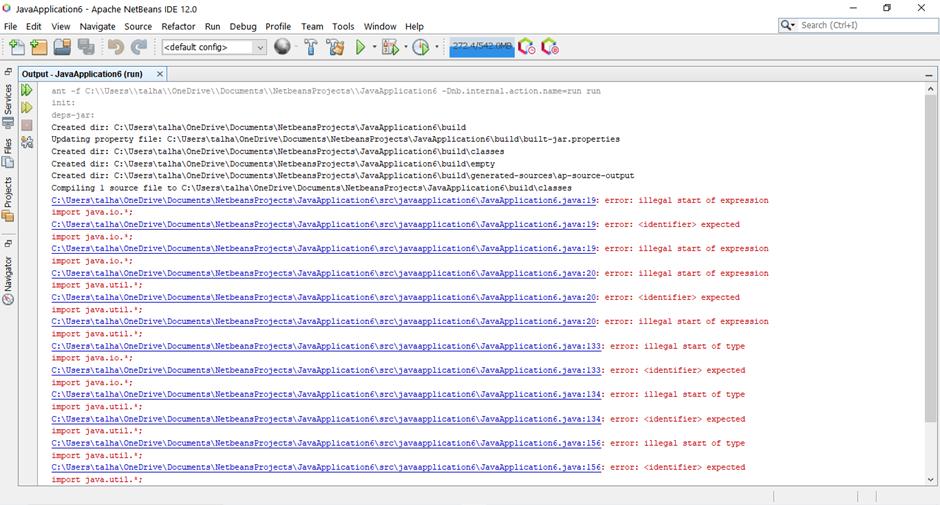Question
How to position this code so it runs without any errors as I always get errors and do not know how to run this code.
How to position this code so it runs without any errors as I always get errors and do not know how to run this code.
I am trying to run this code in NetBeans ide. Can you send me screenshots on exactly how to position this code so it runs without any errors as I always get errors and do not know how to run this code. Also let me know if I'm doing anything wrong. Is the code wrong.
This is all the code
import java.io.*;
import java.util.*;
// Note: considering characters in the graph as numeric values for easy understanding.
class Graph
{
int vertices;
int[][] adjacency_matrix;
// constructor to initialize number of vertices and
// size of adjacency matrix
public Graph(int vertices)
{
this.vertices = vertices;
adjacency_matrix = new int[vertices][vertices];
}
public void insert(int source, int destination)
{
// make adjacency_matrix[i][j] = 1 if there is
// an edge from i to j
adjacency_matrix[destination-1] = 1;
}
public boolean isSinkPresent(int i)
{
for (int j = 0 ; j < vertices ; j++)
{
// if any element in the row i is 1, it means
// that there is an edge emanating from the
// vertex, which means it cannot be a sink
if (adjacency_matrix[i][j] == 1)
return false;
// if any element other than i in the column
// i is 0, it means that there is no edge from
// that vertex to the vertex we are testing
// and hence it cannot be a sink
if (adjacency_matrix[j][i] == 0 && j != i)
return false;
}
//if none of the checks fails, return true
return true;
}
// we will eliminate n-1 non sink vertices so that
// we have to check for only one vertex instead of
// all n vertices
public int eliminate()
{
int i = 0, j = 0;
while (i < vertices && j < vertices)
{
// If the index is 1, increment the row we are
// checking by 1
// else increment the column
if (adjacency_matrix[i][j] == 1)
i = i + 1;
else
j = j + 1;
}
// If i exceeds the number of vertices, it
// means that there is no valid vertex in
// the given vertices that can be a sink
if (i > vertices)
return -1;
else if (!isSinkPresent(i))
return -1;
else return i;
}
//Code for Remove vertex
public void removeVertex(int x)
{
// checking if the vertex is present
if (x > n)
{
System.out.println("Vertex not present!");
return;
}
else
{
int i;
// removing the vertex
while (x < n)
{
// shifting the rows to left side
for (i = 0; i < n; ++i)
{
adjacency_matrix[i][x] = adjacency_matrix[i][x + 1];
}
// shifting the columns upwards
for (i = 0; i < n; ++i)
{
adjacency_matrix[x][i] = adjacency_matrix[x + 1][i];
}
x++;
}
// decreasing the number of vertices
n--;
}
}
}
}
3.
import java.io.*;
import java.util.*;
class Parser
{
public static void main (String[] args) {
while (reader.hasNextLine()) {
String[] nums = reader.nextLine().split(", ");
addEdge(adj, Integer.parseInt(nums[0]), Integer.parseInt(nums[1]));
}
}
static void addEdge(List> adj, int u, int v) {
int biggerVertex = (u > v ? u : v) + 1;
//Keep increasing the size until it's right
while (adj.size() < biggerVertex) adj.add(new ArrayList<>());
adj.get(u).add(v);
adj.get(v).add(u);
}
}
4.
import java.util.*;
public class Main{
static List> adj;
// Function to add edge u --> v
static void addEdge(char u, char v){
adj.get(u).add(v);
}
// Helper function to check for cycle.
static boolean checkCycleUtil (char node,
boolean visited[], boolean inStack[]){
// Check if node exists in the
// recursive stack.
if (inStack[node])
return true;
// Check if node is already visited.
if (visited[node])
return false;
// Marking node as visited.
visited[node] = true;
// Marking node to be present in
// recursive stack.
inStack[node] = true;
// Iterate for all adjacent of
// 'node'.
for (char v : adj.get(node)){
// Recurse for 'v'.
if (checkCycleUtil(v, visited, inStack))
return true;
}
// Mark 'node' to be removed
// from the recursive stack.
inStack[node] = false;
// Return false if no cycle exists.
return false;
}
// Function to check for the cycle.
static boolean checkCycle(int V, int E){
// Defining visited and inStack array
// to keep track of visited vertices
// and vertices in Recursive stack.
boolean visited[] = new boolean[V];
boolean inStack[] = new boolean[V];
for (int i = 0; i < V; i++){
// Check if cycle exists.
if (checkCycleUtil((char)i, visited, inStack)){
return true;
}
}
// Returning false, if no cycle is found.
return false;
}
public static void main(String args[]){
// Defining the number of Vertices
// and the number of edges.
int V = 5, E = 9;
// Defining Adjacency List
adj = new ArrayList<>();
for (int i = 0; i < V; i++)
adj.add(new ArrayList<>());
// Building the Graph same as example 1.
addEdge(a,b);
addEdge(a,c);
addEdge(b,d);
addEdge(b,e);
addEdge(d,e);
addEdge(e,c);
addEdge(c,f);
addEdge(c,b);
addEdge(e,f);
// If the graph contains cycle
// Print YES
if(checkCycle(V, E))
System.out.println("YES");
// Otherwise Print NO
else
System.out.println("NO");
}
}
These are my screenshots.




O JavaApplication6 - Apache NetBeans IDE 12.0 File Edit View Navigate Source Refactor Run Debug Profile Team Tools Window Help Proj... X Files Services Java Application4.java Test Packages Libraries Test Libraries JavaApplication5 Source Packages javaapplication5 JavaApplication5.java Libraries JavaApplication6 Source Packages LLL0 77788 javaapplication6 JavaApplication6.java JavaApplication6 - Navigat... X Members 4500 JavaApplication6 JavaApplication6() main(String[] args) : > : > : > Main Parser 2 3 Start Page x Source History 1 / To change this license header, choose License Headers in Project Properties. * To change this template file, choose Tools Templates and open the template in the editor. package javaapplication6; 4 6 7 8 9 10 11 12 13 14 Q 15 16 17 B 21 22 23 0- 24 25 26 27 . NC JavaApplication4.java x Java Application5.java x JavaApplication6.java @author talha "/ public class JavaApplication6 [ 413.2/4650MB import java.io.*; import java.util. * @param args the command line arguments */ public static void main(String[] args) { 2. // Note: considering characters in the graph as numeric values for easy understanding. class Graph ( int vertices; int[] [] adjacency_matrix; // constructor to initialize number of vertices and javaapplication6.JavaApplication6 Main I Q- Search (Ctrl+1) 250:2 0 X > 88 LIET T INS Windows (CR..
Step by Step Solution
3.30 Rating (150 Votes )
There are 3 Steps involved in it
Step: 1
Youll need to organize it into a cohesive program Heres how you can do it step by step 1 Import Statements and Graph Class Place the import statements ...
Get Instant Access to Expert-Tailored Solutions
See step-by-step solutions with expert insights and AI powered tools for academic success
Step: 2

Step: 3

Ace Your Homework with AI
Get the answers you need in no time with our AI-driven, step-by-step assistance
Get Started


